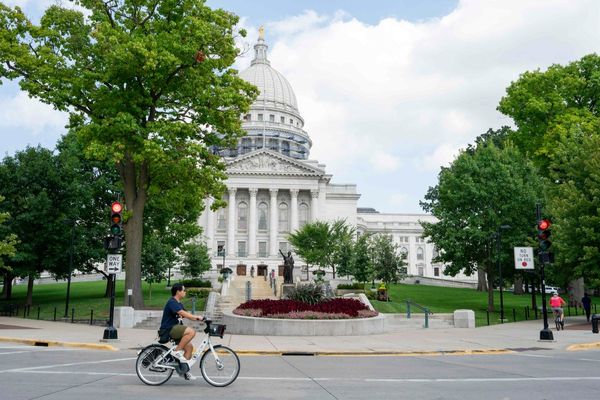PHILADELPHIA — Clean and safe streets. More joy. And definitely a new mayor who hasn't checked out.
That's what Philadelphia needs to boost its nascent economic recovery, business leaders said last week at a Center City District confab.
Real estate developers, store owners and tenants, civic organizations, and lobbyists traded stories at the Union League of Philadelphia at an event hosted by the CCD and the Central Philadelphia Development Corp. — and rolled their eyes at what they see as a lack of leadership in city government.
Not in the room? Mayor Jim Kenney, who loomed large in his absence.
"We have a rudderless ship," said James Pearlstein, president of Pearl Properties, a real estate investment and development firm.
"Every store on Walnut Street has a security guard," he said. "Why? There's a lot more violent, petty crime that could easily be handled."
The Center City District, a business leadership and lobbying organization, has upped the number of its safety officers and bicycle patrols to help and is meeting with local police officials as well.
"We need leadership; we need streets to be clean and safe. We need people to want to come visit us," Paige Jaffe, a real estate broker and managing director of JLL's retail leasing practice in the Greater Philadelphia region, told the gathering.
"I have two young kids, and my family and I live here in Center City. My children attend public school, and my friends outside the city ask me, 'How could I do that?'" Jaffe said. "If it's clean and safe, people feel comfortable coming here and living here."
The city is feeling the ripple effect of Kenney's lame-duck administration — Kenney's term ends in 2024 — and his now-infamous comments after the Ben Franklin Parkway shooting on July Fourth.
"I'm waiting for something bad to happen all the time. I'll be happy when I'm not here, when I'm not mayor, and I can enjoy some stuff," Kenney said, which critics deemed as effectively quitting his job early.
'We need more joy'
Business leaders want the next mayor to leave behind the Philly shrugs and woe-is-me that is Kenney.
"We need somebody that smiles," Jacob Cooper, real estate agent with MSC, said to nods and laughter in the audience of about a hundred people.
"We have plenty of pride in Philly; we need more joy," he said. "That will bring outside capital and visitors not from Philadelphia to come and spend money. So I'm looking forward to meeting all the candidates" for mayor.
The businesspeople were looking to embrace a changemaker attitude that would build on encouraging signs in the local economy. Out of 1,856 storefronts in the Center City core district, about 17% are vacant as of June, down from 30% in January 2021, according to Prema Gupta, vice president of the Center City District.
Half of the 174 new storefronts opened since 2020 are restaurants, and 42 more are set to open. The city's "streeteries" offer 68% more outdoor seats than before the pandemic, even with the return of indoor seating, the latest Center City District data show.
And yet, there's much to do.
"We still have the largest percentage of poverty among major cities at 24%," said John Usdan, chief executive of Midwood Investment & Development. "We need a plan to fix that, to invest in social infrastructure."
Without fixing the homeless problem, education, and the regressive tax system, "you can't advance," he said, citing Houston's decision to move the city's entire homeless population of 25,000 into newly constructed houses.
Too many empty office towers
One speed bump to a full recovery is office workers; roughly half of those who used to work in Center City haven't returned. Walnut Street is thriving, fed by foot traffic from the Avenue of the Arts to Rittenhouse, but Market Street, with towers mostly empty, is quiet.
"The biggest impediment to recovery is office inventory," Usdan said.
Further, many of Philadelphia's offices are old and costly to convert. Tenants want sustainable buildings — carbon neutral with outdoor space, he said.
Pearlstein said the downtown office market doesn't look as if it's set to recover anytime soon, noting that Comcast hasn't mandated workers come back into the office full time, which is hurting tenants on Market and Arch Streets.
"The office market isn't great. Rents aren't going much higher. We're going to see a building by building conversion" to residential apartments, he predicted.
"Just go to 16th and Market Streets," Pearlstein said. "That used to be like the 50-yard line at lunchtime. But now Market Street has a long road to recovery."
The possibility of a new 76ers arena in Center City "could drive midafternoon traffic on East Market Street, which has struggled even with the Fashion District," Cooper said.
Much like the Capital One Arena in Washington, D.C., a Sixers stadium on Market between 10th and 11th Streets could "create enough gravity to attract restaurants, offices, and residential buildings, which followed the building of the arena. But we still need improved transit," Usdan said.
Solutions for Philly
That said, employers such as OceanFirst Bank, a publicly traded banking concern, said it's expanding in its current Two Logan Square location, roughly doubling the space and adding in-person employees, said Susanne Svizeny, a regional president at OceanFirst Bank.
"We needed to hire and continue to grow, and we're committed to Philadelphia," she said in an interview Friday. OceanFirst is one of the prime lenders to Walnut Street developers of retail, and she noted that "Philly is much further along in its recovery than cities like Baltimore. Yet, it's still viewed as a hard place to get things done."
As for a new mayor, "the one common thing we hear from our borrowers is the gun violence, and security does concern people," said Brad Fouss, the bank's market president for Greater Philadelphia. "We're not the only city where that's happening, so it's not unique to Philly. But it's part of getting it fixed, and driving office workers back into the city."







